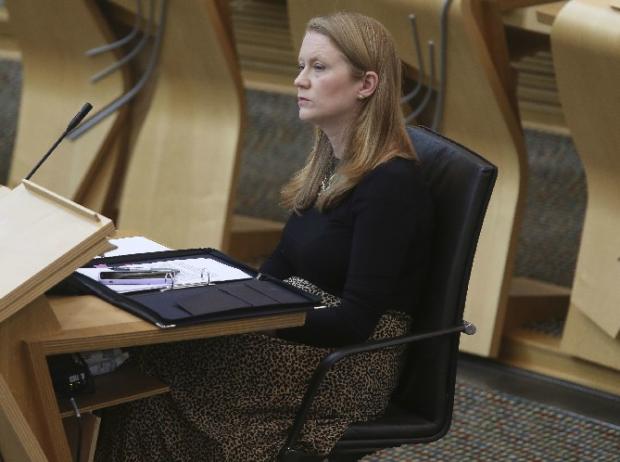Covid: Fears as tens of thousands of pupils forced into isolation for two weeks
Self-isolation forced tens of thousands of pupils to stay away from classrooms for at least two weeks over the last school year, sparking fresh fears that Scotland’s poverty-related attainment gap could grow.
National figures show 43,600 children and young people were affected during the Covid-hit 2020/21 session – a little over six per cent of all those in local authority-run primary, secondary and special schools.
The proportion was markedly higher for those living in poorer areas as classified by the Scottish Index of Multiple Deprivation (SIMD), with a rate of 10% recorded for those in the SIMD1 category.
Education Secretary Shirley-Anne Somerville stressed that additional funding of £450 million had been provided during 2020/21 and 2021/22 to “accelerate” learning recovery and support wellbeing.
READ MORE: Exams return in 2022 but fears of assessment ‘overload’
But charity leaders reacted with alarm to the statistics, which come after an announcement that pupils aged 5 to 17 who are identified as close contacts of Covid-positive individuals will no longer have to self-isolate, provided they obtain a negative PCR test result.
Amy Woodhouse, Joint Interim Chief Executive of Children in Scotland, said: “Children and young people have repeatedly told us how disruptive and unsettling their education has been over the last 17 months. While there have been some children who have benefitted from learning at home, many others have really struggled.
“Given what we already know about the poverty-related attainment gap, it is concerning to read that children and young people living in areas of high poverty are more likely to have been out of school through self-isolation requirements. We are concerned that this could add further to existing education inequalities.”
She added: “Moving forward from this point, our key ask is that children, young people and families are meaningfully involved in Scottish Government decision- making. They have a vital perspective to include when deciding where the balance between important public health priorities, educational entitlements and mental health concerns should ideally lie – and how we can introduce mitigating actions to reduce the impact of any future restrictions on children and young people’s lives.”
National statistics show rates of absence from school due to self-isolation were much higher in Glasgow and Clackmannanshire, where figures of 16% and 15%, respectively, were recorded. The number of pupils in local authority-run schools who isolated for at least a week but less than a fortnight was 101,200.
 Oliver Mundell, of the Scottish Conservatives, is concerned about the statistics.
Oliver Mundell, of the Scottish Conservatives, is concerned about the statistics.
Scottish Conservative Oliver Mundell, Shadow Education Secretary, said the data highlighted the “severe disruption far too many of our pupils have suffered” during the pandemic.
“The attainment gap is widening on the SNP’s watch and this shows that poorer pupils were once again hardest hit as a result of having to self-isolate,” he added.
“SNP ministers continue to claim closing the attainment gap is their defining mission, but during and before the pandemic they haven’t put the measures in place to tackle it. As we aim to recover from the pandemic, it is imperative the SNP’s plans for education firmly ensure every pupil has the same chance of succeeding.”
COMMENT: On the SQA and Scottish school exams, we need to redefine success
Ross Greer, education spokesman for the Scottish Greens, said: “Thousands of pupils could have avoided those long periods of self-isolation if regular testing had been made available in schools from last August. Instead, it took until the Greens forced and won a parliamentary vote in November for this action to be taken.
“The Covid education recovery plan must include clear commitments to support the working class and disabled young people whose learning was disproportionately affected by the pandemic, but it cannot cave in to those who would have us abandon safety measures entirely in the one setting where most of those present remain vaccinated.”
 Education Secretary Shirley-Anne Somerville.
Education Secretary Shirley-Anne Somerville.
Ms Somerville said: “We have been acutely conscious of the need to reduce educational disruption for our children and young people, while maintaining a safe and supportive school environment for staff and pupils. When schools returned on a phased basis at the start of this year, we ensured vulnerable children were among the first to be able to return to in-person learning as soon as it was safe to do so.
“The recently revised approach to self-isolation policy for U18 close contacts means that fewer young people will have to self-isolate, and most will be asked to self-isolate for a much shorter period of time.
“Additional funding of £450 million has already been committed during 2020/21 and 2021/22 to accelerate learning recovery and support children and young people’s health and wellbeing. This includes £240 million for additional school staff and £20 million to deliver summer activities for children, young people and their families with a focus on mental health and wellbeing.”
For all the latest business News Click Here

